Teen Claims He Visited Heaven During Near Death Experience
An Alabama teenager says he had visions of walking with God after a traumatic brain injury pushed him to the brink of death.
Trenton McKinley, a 13-year-old from Mobile, claims he remembers walking through an open field with a shadowy, bearded figure during an apparent near-death experience. The teen said the vision proved to him that God is real.
“There is no other explanation but God,” McKinley told WALA-TV in a May 7 article about his dramatic recovery. “There’s no other way that I could have come back.
Near Death Experiences (NDEs) like the one McKinley describes are a subject debated among researchers. Some are convinced that NDEs have a scientific explanation. The visions could be caused by a spike in neural activity in the brain as it approaches death, for example.
But many of those who have experienced NDEs aren’t satisfied with a scientific explanation, saying that the spiritual nature of such moments are too numerous and widespread to discount entirely.
People who live through NDEs often relate stories about visiting an otherworldly realm, encountering a loving presence, or meeting long-lost loved ones.
McKinley’s recounting of what happened while he was in an impaired state of consciousness appear to contain some of these key elements.
The teen’s accident occurred in March, according to USA Today, while McKinley and a friend were playing with a dune buggy. McKinley was riding behind his friend, in a utility trailer pulled by the buggy. The friend suddenly hit the brakes, causing the trailer to flip over and throwing McKinley onto the concrete, head first.
According to his mother, Jennifer Reindl, the teen was rushed to the hospital with seven skull fractures. She claimed in a March 22 Facebook post that her son flatlined four times, including one instance that lasted 15 minutes.
McKinley said he experienced a vision of heaven. He said he recalled walking through an open field with a shadowy figure.
“I don’t remember faces. I saw a shadow and I was walking through a field with the shadow,” the teen told the Christian Broadcasting Network, an evangelical production company, on May 10.
He told CBN that in the vision, he was holding a baby in one arm. His mother told him it could have been a baby boy she had lost through a miscarriage.
“Mom thinks it could have been my little brother,” McKinley said.
Dr. Andrew Newberg, a physician at Jefferson University Hospitals in Philadelphia who studies how the brain functions during various religious and mystical experiences, told HuffPost that what McKinley described is in line with an NDE.
Newberg said that an NDE’s common core elements are a knowledge of one’s death, a tunnel experience, meeting others, feeling peacefulness, seeing a beautiful realm of light with beautiful nature scenes, coming to a decision (either on their own or through others that they meet) that one must go back, and then returning to life.
He believes NDEs can occur at the time of death, but can also occur in life-threatening situations. Still, he noted that many people who come back from life-threatening scenarios do not report an NDE.
“The problem is that the person is unconscious and cannot be spoken to in order to find out what they are experiencing and when,” Newberg said. “Further, it has always been difficult to know the exact state of the person. Just because the heart stops does not inherently mean that brain activity ceases. There are most likely many neurons in varying stages of dying, but they might still be functional in these states.”
Serious injuries can also spawn scams concerning NDEs, such as one perpetrated by an Ohio boy who was in a coma after a 2004 traffic accident. He regained consciousness and, in 2010, a book he wrote with his father ― The Boy Who Came Back From Heaven ― became a best seller. In 2015, the boy ― now a young man ―admitted he had made up his story of meeting Jesus and Satan.
Regardless of the details of McKinley’s NDE, the teen’s family has been heartened by his dramatic physical recovery.
Doctors reportedly told Reindl that there was little hope her son would ever recover fully. The mother said she signed a document that would have allowed for McKinley’s organs to be donated upon his death.
But shortly afterward, Reindl said hospital staff noticed that McKinley was able to move his hands and then his feet. Later on, he was able to open his eyes. The teen slowly began to heal ― recovering his memories and eventually shooting basketballs into a hoop at the hospital. In April, Reindl posted a video on Facebook of her son walking with the help of a nurse.
McKinley still has a long way to go. CBN reports that the child suffers from nerve damage and seizures. He also needs additional surgeries to help fix his fractured skull.
In the meantime, Reindl hopes McKinley’s story helps change lives.
“My hopes are that our story brings hope to any mother out there facing such odds,” she wrote on Facebook.
HuffPost reached out to Children’s of Alabama hospital for confirmation of Reindl’s story. The hospital declined to provide details about McKinley’s injuries and recovery, but confirmed that the teen was treated and released.
Newberg said there’s still much about NDEs that scientists have not figured out.
“There are too many aspects of NDEs that are not accounted for by any singular answer,” he wrote in an email. “However, NDEs might provide a unique opportunity to explore whether we have a soul or consciousness that can go beyond the body. If we can truly verify the anomalous experiences, then it could result in a paradigm shift in terms of how we scientifically understand the brain and soul.”
For his part, McKinley appears convinced that what he experienced in the hospital is proof of God’s love.
“Jesus is watching you at all times. He’s with you,” the teen said on CBN. “Believe. Never lose faith.”
Also on HuffPost
Love HuffPost? Become a founding member of HuffPost Plus today.
Galileo Galilei (1564 - 1642)
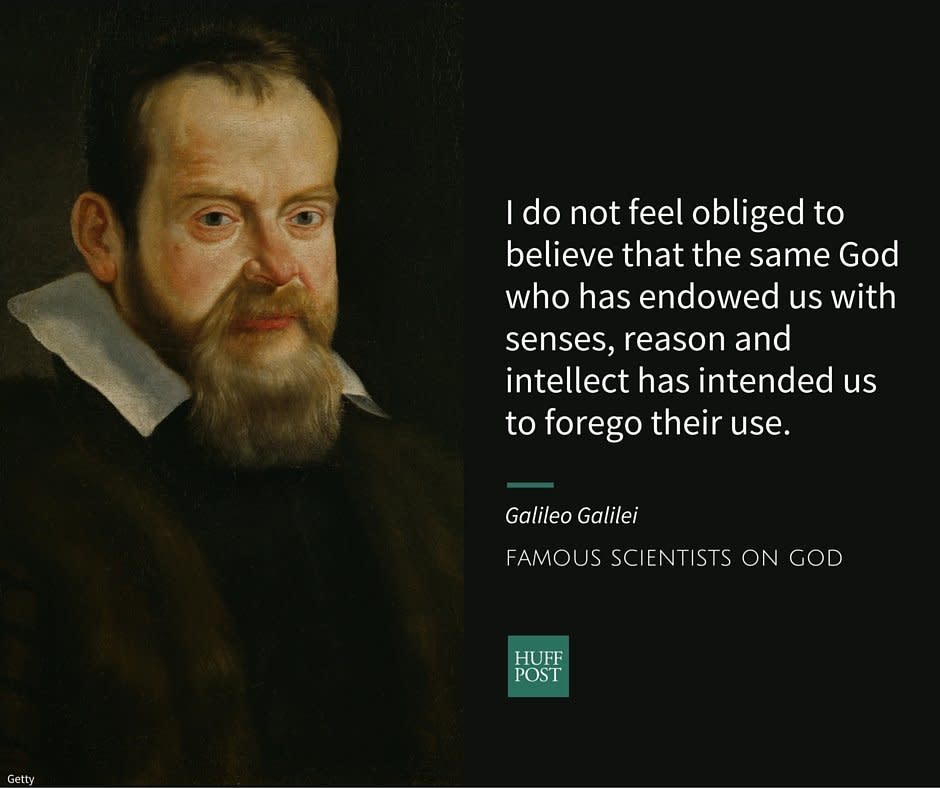
Writing to the Grand Duchess Christina of Tuscany, Galileo criticized philosophers of his time who blindly valued Biblical authority over scientific evidence.
"I do not feel obliged to believe that the same God who has endowed us with senses, reason and intellect has intended us to forego their use and by some other means to give us knowledge which we can attain by them. He would not require us to deny sense and reason in physical matters which are set before our eyes and minds by direct experience or necessary demonstrations."
Sir Francis Bacon (1561 - 1626)
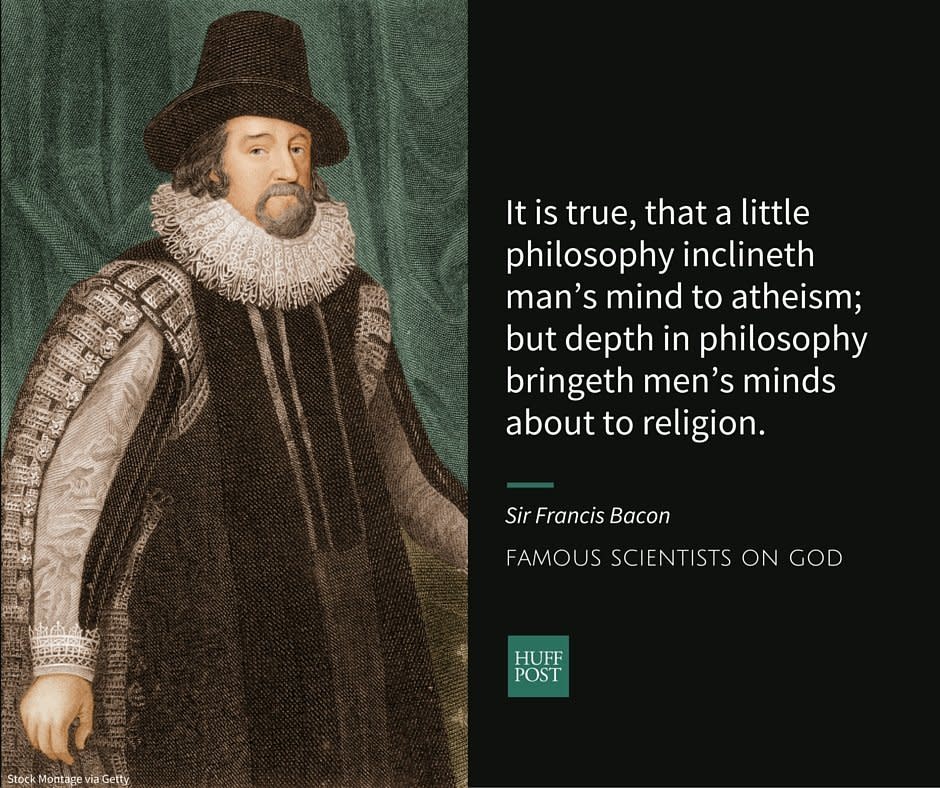
In an essay on atheism, Bacon wrote:
"God never wrought miracle to convince atheism, because his ordinary works convince it. It is true, that a little philosophy inclineth man’s mind to atheism; but depth in philosophy bringeth men’s minds about to religion. For while the mind of man looketh upon second causes scattered, it may sometimes rest in them, and go no further; but when it beholdeth the chain of them, confederate and linked together, it must needs fly to Providence and Deity."
Charles Darwin (1809 - 1882)

In an 1873 letter to Dutch writer Nicolaas Dirk Doedes, Darwin wrote:
"I may say that the impossibility of conceiving that this grand and wondrous universe, with our conscious selves, arose through chance, seems to me the chief argument for the existence of God; but whether this is an argument of real value, I have never been able to decide. I am aware that if we admit a first cause, the mind still craves to know whence it came and how it arose. Nor can I overlook the difficulty from the immense amount of suffering through the world. I am, also, induced to defer to a certain extent to the judgment of the many able men who have fully believed in God; but here again I see how poor an argument this is. The safest conclusion seems to be that the whole subject is beyond the scope of man's intellect; but man can do his duty."
Maria Mitchell (1818 - 1889)

After hearing a minister preach about the dangers of science, Mitchell wrote:
"Scientific investigations, pushed on and on, will reveal new ways in which God works, and bring us deeper revelations of the wholly unknown."
Marie Curie (1867 - 1934)
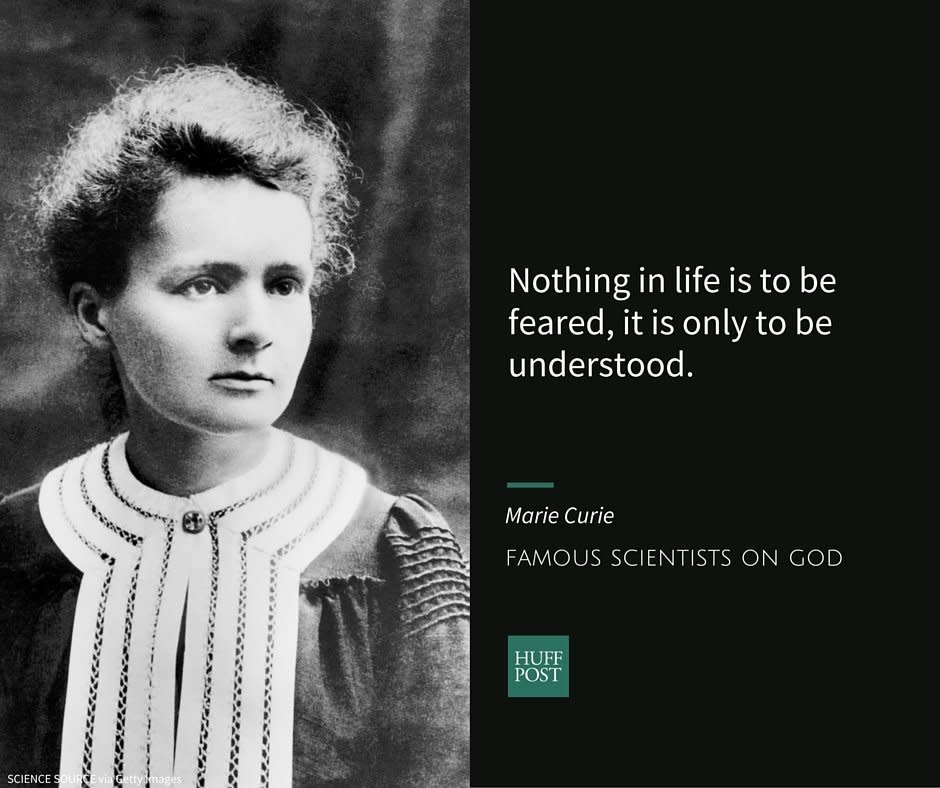
She is quoted as saying:
"Nothing in life is to be feared, it is only to be understood. Now is the time to understand more, so that we may fear less."
Albert Einstein (1879 - 1955)
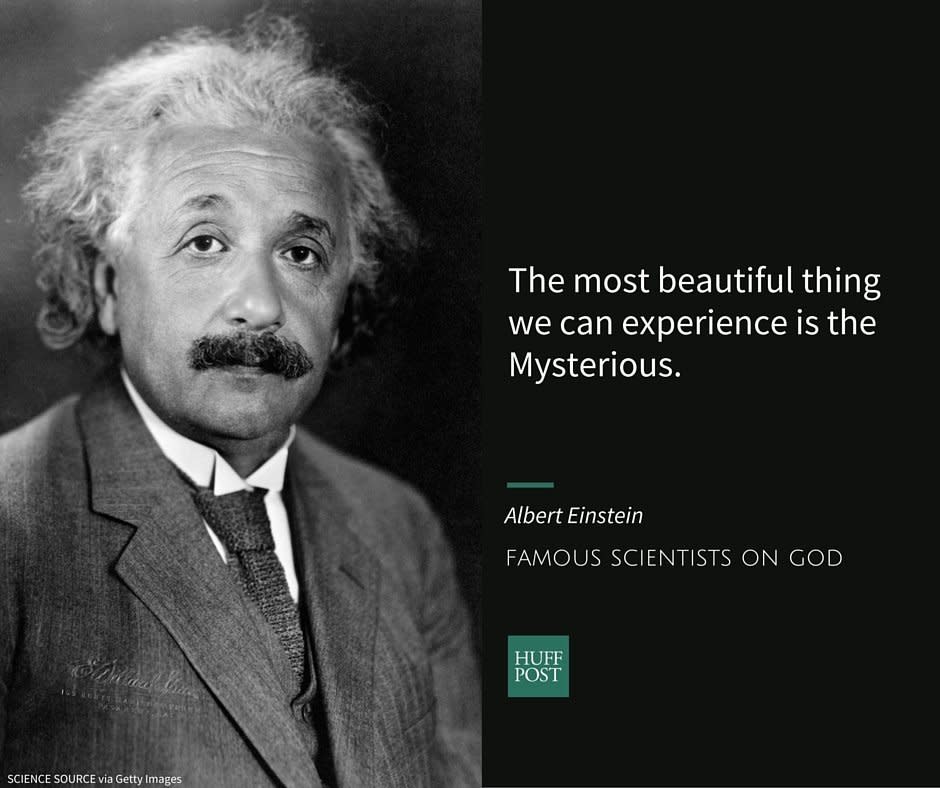
In a 1954 essay for NPR, Einstein wrote:
"The most beautiful thing we can experience is the Mysterious — the knowledge of the existence of something unfathomable to us, the manifestation of the most profound reason coupled with the most brilliant beauty. I cannot imagine a God who rewards and punishes the objects of his creation, or who has a will of the kind we experience in ourselves. I am satisfied with the mystery of life's eternity and with the awareness of — and glimpse into — the marvelous construction of the existing world together with the steadfast determination to comprehend a portion, be it ever so tiny, of the reason that manifests itself in nature. This is the basics of cosmic religiosity, and it appears to me that the most important function of art and science is to awaken this feeling among the receptive and keep it alive."
Rosalind Franklin (1920 - 1958)
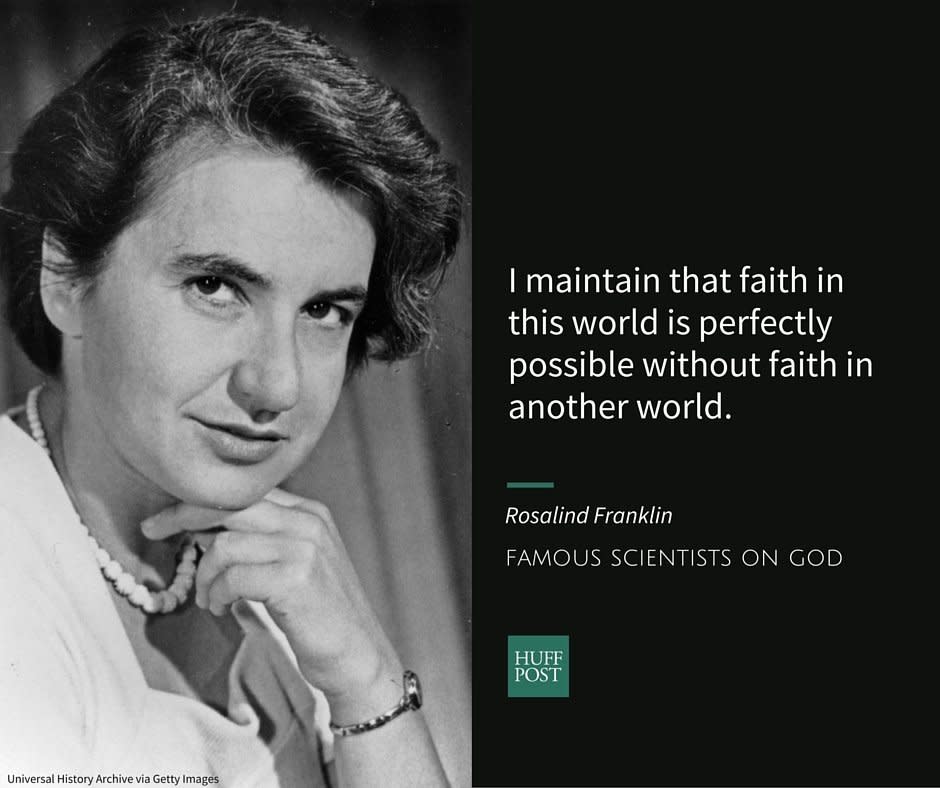
When her father accused her of making science her religion, Franklin told him that she had a different definition of faith:
"In my view, all that is necessary for faith is the belief that by doing our best we shall come nearer to success and that success in our aims (the improvement of the lot of mankind, present and future) is worth attaining. Anyone able to believe in all that religion implies obviously must have such faith, but I maintain that faith in this world is perfectly possible without faith in another world...I see no reason to believe that a creator of protoplasm or primeval matter, if such there be, has any reason to be interested in our insignificant race in a tiny corner of the universe, and still less in us, as still more insignificant individuals."
Carl Sagan (1934 - 1996)
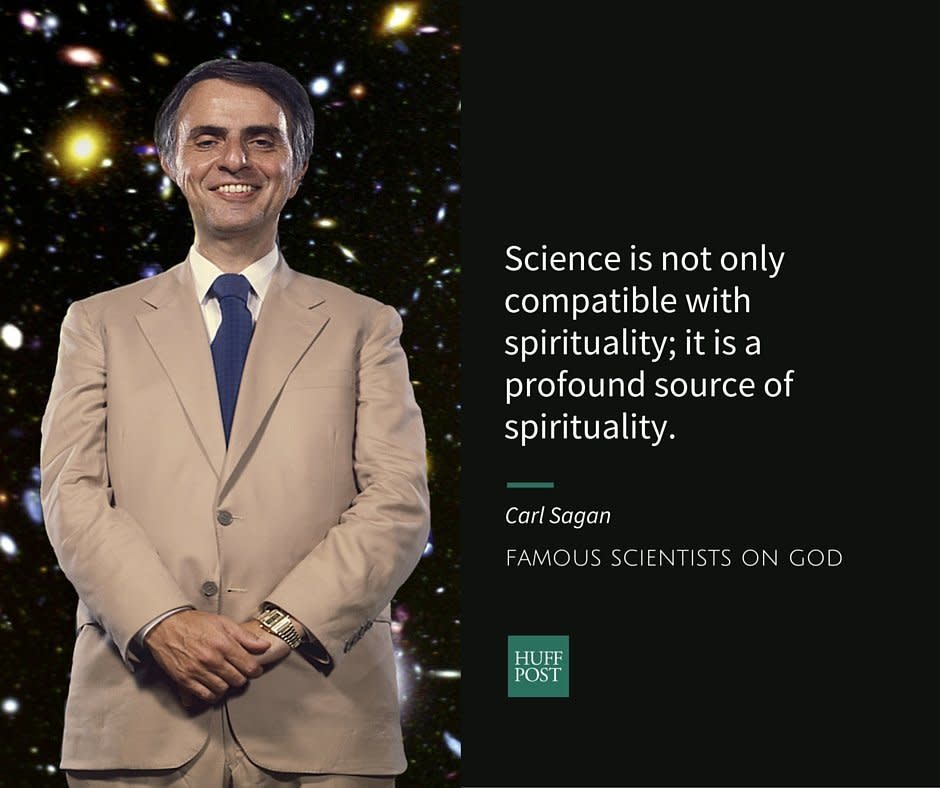
In his book, The Demon-Haunted World: Science as a Candle in the Dark, Sagan writes:
"Science is not only compatible with spirituality; it is a profound source of spirituality. When we recognize our place in an immensity of light years and in the passage of ages, when we grasp the intricacy, beauty and subtlety of life, then that soaring feeling, that sense of elation and humility combined, is surely spiritual."
Stephen Hawking (Born 1942)
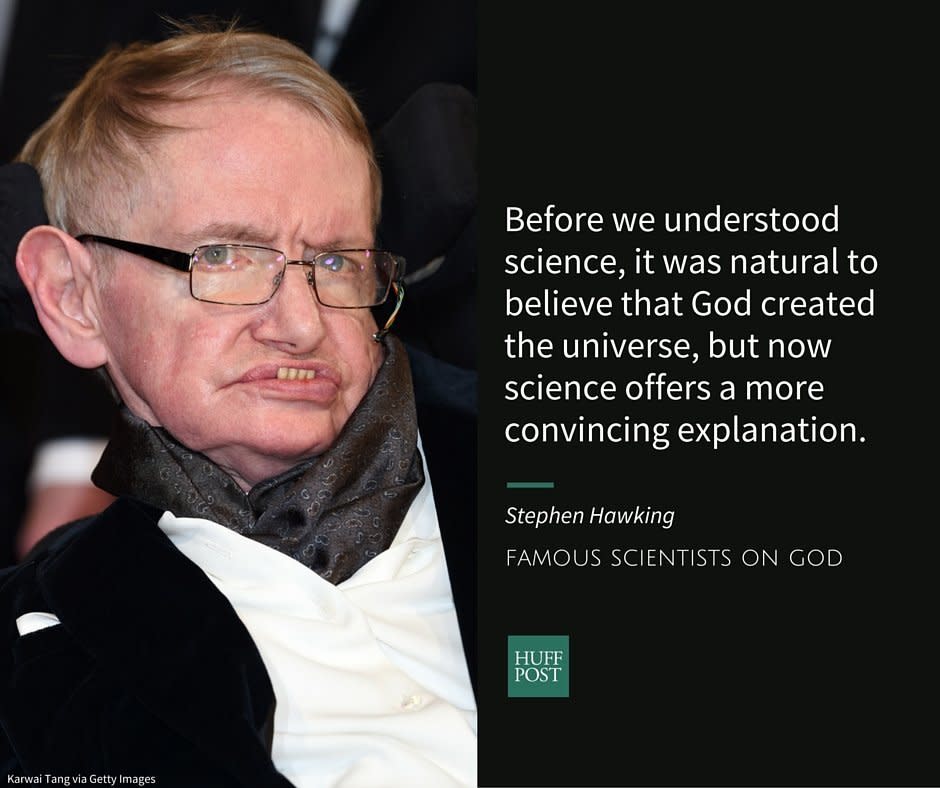
In an interview with the Spanish newspaper El Mundo, Hawking said:
"Before we understood science, it was natural to believe that God created the universe, but now science offers a more convincing explanation."
Venkatraman Ramakrishnan (Born 1952)

In an interview with the Hindustan Times, he said:
"There is no scientific basis for how movement of planets and stars can influence our fate. There is no reason for time of birth to influence events years later. The predictions made are either obvious or shown to be random ... A culture based on superstitions will do worse than one based on scientific knowledge and rational thoughts.”
Neil deGrasse Tyson (Born 1958)
![Neil deGrasse Tyson is an astrophysicist and a popular television science expert. He told The Huffington Post thathe isn't convinced by religious arguments about the existence of a "Judeo-Christian" god that is all-powerful and all-good, especially when he observes the death and suffering caused by natural disasters. Still, he told <a href="http://bigthink.com/think-tank/neil-degrasse-tyson-atheist-or-agnostic" target="_blank">Big Think</a> that while he's often "claimed by atheists," he's actually more of an agnostic.<br /><br />In<a href="http://www.haydenplanetarium.org/tyson/buy/books/death-by-black-hole" target="_blank"> <i>Death By Black Hole</i>,</a> a collection of science essays, Tyson <a href="http://www.haydenplanetarium.org/tyson/read/quotes-by-neil-degrasse-tyson/science-quotes" target="_blank">writes</a>:<br /><br /><i>"So you're made of detritus [from exploded stars]. Get over it. Or better yet, celebrate it. After all, what nobler thought can one cherish than that the universe lives within us all?"</i>](https://s.yimg.com/ny/api/res/1.2/qlaboucbO291SgzEDF69cA--/YXBwaWQ9aGlnaGxhbmRlcjt3PTk2MA--/https://img.huffingtonpost.com/asset/56b0ef5b1800002d0080b1b9.jpg)
In Death By Black Hole, a collection of science essays, Tyson writes:
"So you're made of detritus [from exploded stars]. Get over it. Or better yet, celebrate it. After all, what nobler thought can one cherish than that the universe lives within us all?"
Francis Collins (Born 1950)
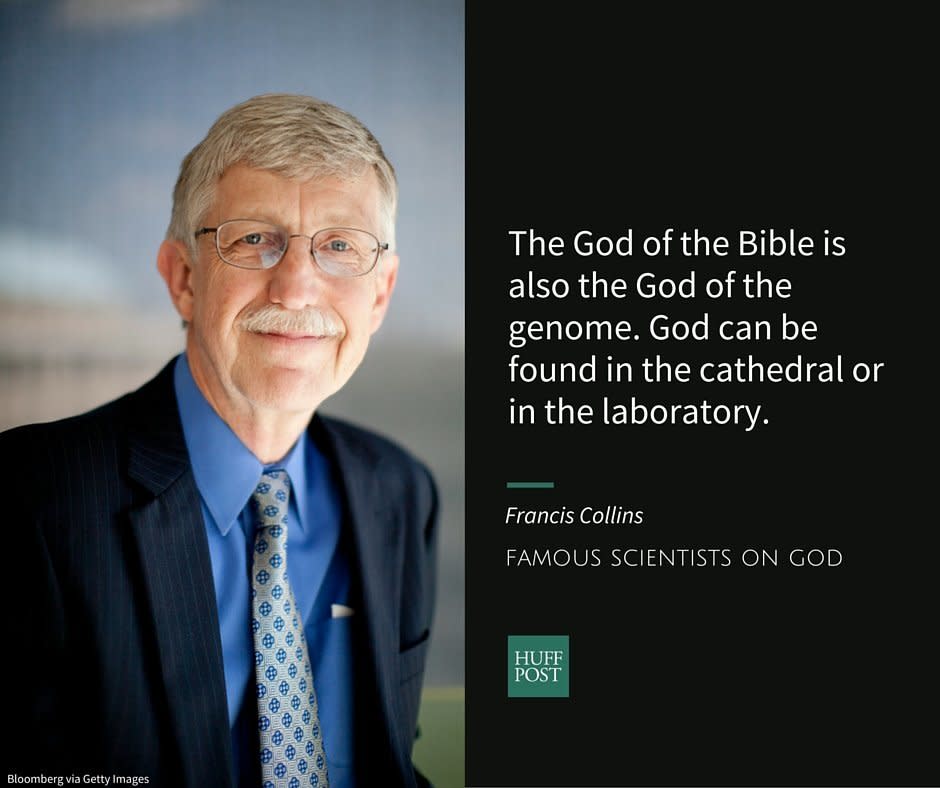
In an essay for CNN, Collins writes:
"I have found there is a wonderful harmony in the complementary truths of science and faith. The God of the Bible is also the God of the genome. God can be found in the cathedral or in the laboratory. By investigating God's majestic and awesome creation, science can actually be a means of worship."
This article originally appeared on HuffPost.

